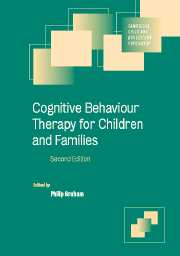Book contents
- Frontmatter
- Contents
- List of contributors
- 1 Introduction
- Part I Developmental cognitive theory and clinical practice
- 2 Cognitive behaviour therapy for children and adolescents: some theoretical and developmental issues
- 3 Cognitive behavioural therapy in developmental perspective
- 4 Psychological therapies: a family of interventions
- Part II Engagement and assessment
- Part III Client groups
- Part IV Applications in psychosocial adversity
- Part V Applications in specific child and adolescent psychiatric disorders
- Part VI CBT applications in preventive interventions
- Index
- References
3 - Cognitive behavioural therapy in developmental perspective
Published online by Cambridge University Press: 21 August 2009
- Frontmatter
- Contents
- List of contributors
- 1 Introduction
- Part I Developmental cognitive theory and clinical practice
- 2 Cognitive behaviour therapy for children and adolescents: some theoretical and developmental issues
- 3 Cognitive behavioural therapy in developmental perspective
- 4 Psychological therapies: a family of interventions
- Part II Engagement and assessment
- Part III Client groups
- Part IV Applications in psychosocial adversity
- Part V Applications in specific child and adolescent psychiatric disorders
- Part VI CBT applications in preventive interventions
- Index
- References
Summary
Studies showing the effectiveness of cognitive behavioural therapy (CBT) for children have proliferated in recent years. Findings from these investigations provide clear evidence that CBT is an effective clinical tool for treating some of the more common psychological disorders in children and adolescence, principally anxiety and depression (Kendall, 1985; Harrington et al., 1998). Given that this first essential hurdle has been cleared, attention can now be directed towards two follow-on questions: what are the mechanisms underlying effective treatment and how do we understand the inevitable variation in treatment response? This chapter addresses these latter questions by appealing to developmental theory and research relevant to social cognitions and psychological disorders in children and adolescence.
The aims of the chapter are to outline why a developmental model of CBT is needed and how one might be constructed; to review illustrative findings from research on children's social cognitions and the extent to which CBT with children is informed by this research; to identify some of the obstacles blocking greater synthesis of developmental and clinical research relevant to CBT with children; and to draw implications for assessment and interventions.
What is a developmental approach?
Before considering what a development perspective can add to the practice of CBT with children, we first need to assess what it is. A developmental approach as applied to CBT with children can be characterized by several distinct features.
- Type
- Chapter
- Information
- Cognitive Behaviour Therapy for Children and Families , pp. 25 - 47Publisher: Cambridge University PressPrint publication year: 2004
References
- 1
- Cited by

